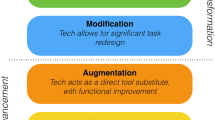Abstract
Professional development is critical in supporting teachers’ use of technological tools in classrooms. This review of empirical research synthesizes the effective elements of professional development programs that support science teachers in learning about technology integration. Studies are examined that explore how professional development supports technology use within inquiry-based and traditional science instruction. Implications for future research are discussed in four areas: understanding and building on teachers’ beliefs about science and technology; supporting teacher learning by supporting teachers’ examination of students’ work; using technology to support teacher communities and social networks; and sustaining teachers’ learning beyond formal professional development programs.
Similar content being viewed by others
Notes
Fullan and Smith (1999) warn about the “implementation dip” that happens during the initial stages of implementation, even with sufficient support. They also argue that one-shot workshops will not help teachers to persist with technological innovations through this period. Instead, teachers will need continuous assistance from professional developers through the initial implementation, as well as follow-up assistance.
References
Ball DL, Cohen DK (1999) Developing practice, developing practitioners: toward a practice-based theory of professional education. In: Sykes G, Darling-Hammond L (eds) Teaching as the learning profession: handbook of policy and practice. Jossey Bass, San Francisco, pp 3–32
Barab SA, Kling R, Gray JH (eds) (2004) Designing for virtual communities in the service of learning. Cambridge University Press, Cambridge, UK
Becker HJ (1994) How exemplary computer-using teachers differ from other teachers: implications for realizing the potential of computers in schools. J Res Comput Educ 26(3):291–321
Borko H, Mayfield V, Marion S, Flexer R, Cumbo K (1997) Teachers’ developing ideas and practices about mathematics performance assessment: successes, stumbling blocks, and implications for professional development. Teach Teach Educ 13(3):259–278. doi:10.1016/S0742-051X(96)00024-8
Cohen DK, Hill HC (2000) Instructional policy and classroom performance: the mathematics reform in California. Teach Coll Rec 102(2):294–343. doi:10.1111/0161-4681.00057
Cuban L (2001) Oversold and underused: computers in the classroom. Harvard University Press, Cambridge, MA
Davis EA (2003) Knowledge integration in science teaching: analyzing teachers’ knowledge development. Res Sci Educ 34:21–53. doi:10.1023/B:RISE.0000021034.01508.b8
Fishman BJ, Marx RW, Best S, Tal RT (2003) Linking teacher and student learning to improve professional development in systemic reform. Teach Teach Educ 19:643–658. doi:10.1016/S0742-051X(03)00059-3
Fullan M, Smith G (1999) Technology and the problem of change. Retrieved November 3, 2005. http://home.oise.utoronto.ca/~changeforces/Articles_98-99/12_99.htm
Garet MS, Porter AC, Desimone L, Birman BF, Yoon KS (2001) What makes professional development effective? Results from a national sample of teachers. Am Educ Res J 38(4):915–945. doi:10.3102/00028312038004915
Grossman P, Wineburg S, Woolworth S (2001) Toward a theory of teacher community. Teach Coll Rec 103(6):942–1012. doi:10.1111/0161-4681.00140
Guskey TR (1985) The effects of staff development on teachers’ perceptions about effective teaching. J Educ Res 78(6):378–381
Guskey TR (1986) Staff development and the process of teacher change. Educ Res 15(5):5–12
Hawley WD, Valli L (1999) The essentials of effective professional development: a new consensus. In: Sykes G, Darling-Hammond L (eds) Teaching as the learning profession: handbook of policy and practice. Jossey Bass, San Francisco, pp 127–150
Horn IS (2005) Learning on the job: a situated account of teacher learning in high school mathematics departments. Cogn Instr 23(2):207–236. doi:10.1207/s1532690xci2302_2
Kazemi E, Franke ML (2004) Teacher learning in mathematics: using student work to promote collective inquiry. J Math Teach Educ 7(3):203–235. doi:10.1023/B:JMTE.0000033084.26326.19
Linn MC, Davis EA, Bell P (2004) Inquiry and technology. In: Linn MC, Davis E, Bell P (eds) Internet environments for science education. Erlbaum, Mahwah, NJ, pp 3–28
Little JW (1984) Seductive images and organizational realities in professional development. Teach Coll Rec 86(1):84–102
Mishra P, Koehler MJ (2006) Technological pedagogical content knowledge: a framework for teacher knowledge. Teach Coll Rec 108(6):1017–1054. doi:10.1111/j.1467-9620.2006.00684.x
Niederhauser DS, Stoddart T (2001) Teachers’ instructional perspectives and use of educational software. Teach Teach Educ 17:15–31. doi:10.1016/S0742-051X(00)00036-6
Palincsar AS, Magnusson SJ, Marano N, Ford D, Brown N (1998) Designing a community of practice: principles and practices of the GIsML community. Teach Teach Educ 14(1):5–19. doi:10.1016/S0742-051X(97)00057-7
Pedersen JE, Yerrick RK (2000) Technology in science teacher education: survey of current uses and desired knowledge among science educators. J Sci Teach Educ 11(2):131–153. doi:10.1023/A:1009468808876
Penuel WR, Fishman BJ, Yamaguchi R, Gallagher LP (2007) What makes professional development effective? Strategies that foster implementation. Am Educ Res J 44(4):921–958. doi:10.3102/0002831207308221
Richardson V (2003) The dilemmas of professional development. Phi Delta Kappan 84(5):401–406
Singer J, Marx RW, Krajcik JS, Clay-Chambers J (2000) Constructing extended inquiry projects: curriculum materials for science education reform. Educ Psychol 35(3):165–178. doi:10.1207/S15326985EP3503_3
Songer NB, Lee H-S, Kam R (2002) Technology-rich inquiry science in urban classrooms: what are the barriers to inquiry pedagogy? J Res Sci Teach 39(2):128–150. doi:10.1002/tea.10013
Williams M, Linn MC, Ammon P, Gearhart M (2004) Learning to teach inquiry science in a technology-based environment: a case study. J Sci Educ Technol 13(2):189–206. doi:10.1023/B:JOST.0000031258.17257.48
Wilson SM, Berne J (1999) Teacher learning and the acquisition of professional knowledge: an examination of research on contemporary professional development. In: Aran-Nejad A, Pearson PD (eds) Review of research in education, vol 24. pp 173–209
Windschitl M, Sahl K (2002) Tracing teachers’ use of technology in a laptop computer school: the interplay of teacher beliefs, social dynamics, and institutional culture. Am Educ Res J 39(1):165–205. doi:10.3102/00028312039001165
Zhao Y, Pugh K, Sheldon S, Byers JL (2002) Conditions for classroom technology innovations. Teach Coll Rec 104(3):482–515. doi:10.1111/1467-9620.00170
Acknowledgements
This material is based on work supported by the National Science Foundation under grant numbers 0455877, 9805420, 0128062, 0311835, and 0334199. Any opinions, findings, and conclusions or recommendations expressed in this material are those of the author and do not necessarily reflect the views of the National Science Foundation.
Author information
Authors and Affiliations
Corresponding author
Rights and permissions
About this article
Cite this article
Higgins, T.E., Spitulnik, M.W. Supporting Teachers’ Use of Technology in Science Instruction Through Professional Development: A Literature Review. J Sci Educ Technol 17, 511–521 (2008). https://doi.org/10.1007/s10956-008-9118-2
Received:
Accepted:
Published:
Issue Date:
DOI: https://doi.org/10.1007/s10956-008-9118-2




